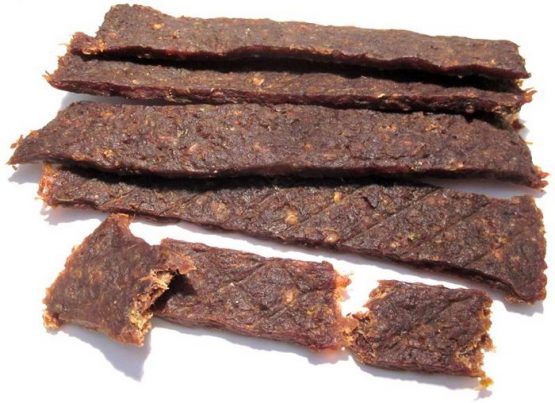This nutritious survival superfood will last for decades
Friday, July 08, 2016 by usafeaturesmedia
http://www.bugout.news/2016-07-08-this-nutritious-survival-superfood-will-last-for-decades.html

(Bugout.news) It may come as a surprise to learn that the most nutritionally-complete food on the planet is not only easy to make at home, but can also be stored unrefrigerated for many years without spoiling.
Dubbed the “original MRE,” or, “Meal, Ready-to-Eat,” pemmican is a survival superfood that was developed by Native Americans many centuries ago. It contains everything the body needs to sustain itself in a healthy fashion for an extended period of time.
Pemmican consists primarily of powdered dried meat mixed in equal amounts with rendered animal fat. The early Americans used meats such as buffalo and elk; today, pemmican is typically made with beef. We suggest using grass-fed meat, as animals fed in this manner are raised significantly more humanely.
The Native Americans were also known to mix in a small amount of dried berries (around five percent — by weight — of the total ingredients).
Pemmican: Enjoyed by early settlers, still provides health benefits today
The Pemmican Manual, by Lex Rooker, contains a wealth of information on the subject, from the history of its use by early settlers to recipes for making pemmican at home.
“When pemmican was discovered by our early Frontiersmen (explorers, hunters, trappers, and the like) it became a highly sought after commodity. The Hudson Bay Company purchased tons of pemmican from the native tribes each year to satisfy the demand,” Rooker explains. “The basic unit of trade was an animal hide filled with pemmican, sealed with pure rendered fat on the seams, and weighed about 90 pounds. As long as it was kept away from moisture, heat, and direct sunlight, it would last for many years with no refrigeration or other method of preservation.”
Those frontiersmen knew a good thing when they saw it. Pemmican was ideal for travel and for stockpiling a source of highly-concentrated nutritious food during lean or cold periods.
The same considerations apply today. For surviving a SHTF scenario, you’ll need portable, high-energy rations that can be stored indefinitely.
There are a few variations on the theme, but most recipes for pemmican follow the same basic methods.
How to make pemmican at home
First, you’ll need to dehydrate your meat (and berries, if you want to add them. Keep in mind berries are prone to spoilage and may shorten the shelf life of the pemmican; it may be worth replacing them with another healthy item such as cinnamon). Use a food dehydrator or an oven at its lowest setting to slowly dry out these ingredients.
Rooker warns of being careful not to overheat the meat, saying that lean meat should be dehydrated below 120 degrees Fahrenheit, ideally staying between 100 and 115 degrees Fahrenheit. Temperatures that are too high will cook the meat too much and take away from the nutritional value.
Once you’ve dried the meat, grind it into a powder and add in the dried berries, if desired.
Next, you must render the fat. You can use tallow (rendered from beef or mutton) or lard (from pork). When doing this on a stovetop, simply heat the ground fat by simmering and stirring occasionally. Then strain the liquid that ultimately forms into a mason jar using a cheesecloth or coffee filter.
Once the fat is rendered and strained, it can be mixed with the dried meat and shaped into balls or set into a mold. The trick is to not use too much fat or the pemmican may eventually turn rancid; add just enough to thoroughly moisten the mixture and bind everything together.
Why not try some variations on the theme?
Honey, which yields a similar shelf life, can be used in place of animal fat. Adding some spices, such as cumin with black pepper, may also be tasty addition to this recipe.
Long-lasting nutrition for active people, SHTF situations
As Rooker notes, pemmican is the perfect food for someone on the move. It’s also ideal for possible SHTF scenarios.
“Ten pounds of pemmican will easily sustain a backpacker for a full week providing 1 1/2 pounds of pemmican per day which would supply 4,400 calories — enough to support strenuous climbing at high altitude and in cold weather.” He adds, “The same 10 pounds of pemmican would supply food for two full weeks of leisure camping activities at 3/4 pound per day providing 2,200 calories.”
By Daniel Barker, Natural News.
Sources for this article include:
http://tacticalintelligence.net
http://www.traditionaltx.us [PDF]
http://www.askaprepper.com
More:
- These 10 Steps Will Make You A Much Better Prepper
- Real-World Preppers Train Like They Fight – Condition Stimulus Training Is Superior
- It’s Official: The U.S. Job Market Has Collapsed But You Won’t Hear The Mainstream Media Discuss It
Bugout.news is part of the USA Features Media network. Get caught up on ALL of the day’s most important news and information here.


